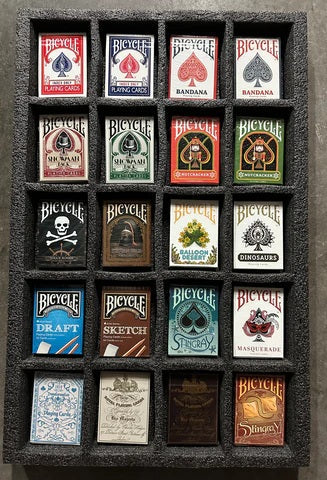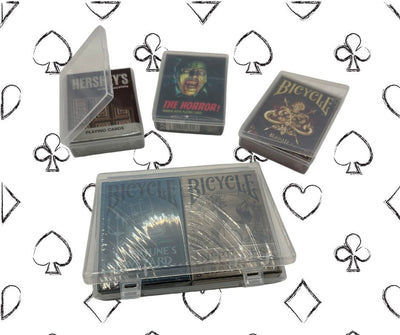Most solitaire card games with a standard deck of playing cards classify as "builder" games. It's a popular archetype, and means that in these games players are trying to arrange all the cards in ascending order from Ace through to King, for each of the four separate suits. The three most popular solitaire games in the world - Klondike, Spider, and FreeCell - and the many games closely related to them, all belong in this category. Besides these three, there are a number of other popular builder games, each of which represents its own family of games: Baker's Dozen, Canfield, La Belle Lucie (Fan games), Beleaguered Castle (Castle games), Sir Tommy, Yukon, and the popular two-deck game Forty Thieves, which has inspired many variants.
While these ten games represent the most popular families of builder games, there are some other very popular builder games in the world of solitaire that you really should know about as well. Some of these do fit loosely in one of the above categories, but deserve special mention. Others don't really fit in any of the above-mentioned families. Either way, these are unquestionably all popular classics in their own right, and can be highly recommended.
In the case of some solitaire types like Beleaguered Castle or Sir Tommy, the main game is somewhat mediocre, and it's really some of the variations that shine. But in the case of the games covered below, they are all worth trying as excellent games of their own. Especially with the games that use two decks, these are games that are thoughtful and satisfying, and can require real skill, rather than being mere exercises in luck and frustration, as can be the case with some of the more simpler solitaire games.
== Games With One Deck ==
Bisley
Overview: Bisley is a classic but more difficult game in the Baker's Dozen family. Like the other games in that family, all the cards are face-up at the outset, so there's no hidden information. You use a tableau of thirteen columns of four cards each to build upwards on the four Aces (which are removed from the tableau as four starting foundations), and simultaneously build downwards on the Kings as four more foundations whenever they become available. You can only move the top card of each column in the tableau, with building in the tableau happening by suit, both up or down.Thoughts: This game feels somewhat like a simpler Forty Thieves style of game that uses a single deck, so there is real room for decision making. Winning can still depend to some extent on the luck of the initial draw, and you can get key cards trapped. Building the foundations from both sides - down from Kings and up from Aces - can increase your chances of completing the game. Unlike Baker's Dozen, you must build by suit in the tableau, but the fact that you can build both up and down gives extra flexibility.
Calculation (Broken Intervals)
Overview: Calculation is a classic derived from Sir Tommy that puts a real spin on the usual solitaire mechanics, because some of the usual rules for building are thrown out of the window. Unlike Sir Tommy, the four foundations begin with any Ace, Two, Three, and Four respectively. The first foundation is built up by 1s (i.e. A,2,3,4 etc), the second by 2s (i.e. 2,4,6,8 etc), the third by 3s (i.e. 3,6,9, etc), the fourth by 4s (i.e. 4,8,Q,3 etc). You win if you manage to get 12 cards onto each foundation in a single deal.Thoughts: This game requires a lot of skill, and new players will find it very difficult to make much progress at all. Experienced players will point out that much of the skill is about how you place cards onto the tableau, and that you can win more often than not. The real trick lies in trying to set these up for future placement on the foundations, by effectively building these in reverse (i.e. from King backwards), initially playing onto the foundations only when necessary. Having the four sequences necessary written down as a guide to consult while playing can really help. Reserving a single waste-pile for Kings is also recommended, since they are the final card placed on each foundation, and can otherwise block other cards. Betsy Ross is a variant that makes the game much easier, albeit more dependent on luck; you have the same goal, but deal three times onto a single discard pile. Other closely related games include One234, Appreciate, and Devil's Grip.
Cruel
Overview: Cruel immediately stands out as an unusual game due to the way re-deals work. With the four Aces beginning as starting foundations, the game begins with a tableau consisting of 12 face-up piles of cards, with only the top cards visible. You can move single cards down by suit within the tableau, but the truly interesting part happens in that whenever you wish you can gather all the cards and re-deal them (a process carefully prescribed by the rules) to create a new tableau; if you've played any cards previously this will alter which cards are now available in the tableau. You can redeal as often as you like, and you lose only when there's no more moves possible from the tableau immediately after a re-deal.Thoughts: This game's popularity began with its inclusion in one of the Microsoft Windows Entertainment Packs in the 1990s, and so it continues to be in demand today. It's a fine example of a game that would be cumbersome to play with real cards, but being able to instantly gather and restack the tableau piles with the click of a button makes it well-suited to a digital version. Despite its idiosyncrasies, Cruel also feels familiar in light of is close connection to other popular solitaires: the tableau is like Baker's Dozen, the game-play feels somewhat like Fortune's Favor (without the stock), and the re-dealing is reminiscent of some fan games; some sites even use a starting layout that displays the tableau in a fan-style with completely open information. Managing the redealing and restacking is key to successful play, and while the game can feel somewhat random initially, experienced players can do very well. Choosing the right cards to play and the right moments to redeal is essential. Cruel is easy to learn, and yet you can get good at it, making it relaxing and fun to play. Other variations of Cruel worth trying include Lucky Thirteen, Perseverance A, Perseverance B, and Ripple Fan.
Flower Garden (Bouquet)
Overview: In this single-deck game you start with a tableau consisting of six columns of six cards each (your "flower-beds" or "garden"), hence the appropriate name Flower Garden. The remaining 16 cards are a face-up reserve (your "seeds"), with all the cards available for use. The idea is to build cards up in suit onto four foundations (your "bouquets") - although some describe the reserve as the "bouquet". Only single cards can be moved in the tableau (flower-beds), building down irrespective of suit.Thoughts: This classic is based on an old Japanese game, and is found in several books and in numerous solitaire programs. It's not an easy game, but with a good draw and careful play a skilled player can win up to a third of their games. You'll have to use the reserve judiciously, and try to get an empty column in the tableau to make manipulation of the cards easier. The game is slightly easier with playing with a variant that has an initial tableau of seven columns with just five cards each. Other variations include Brigade and Stonewall.
Raglan
Overview: Raglan is a Klondike style game with open information, so all the cards are dealt from the outset. The four Aces start as the foundations, which must be built up to Kings, while the remaining cards form a tableau with nine columns varying in size from one card to seven cards, plus there's a seven card reserve. Building within the tableau happens like Klondike, in alternating colour downwards, but only the top card may be moved.Thoughts: The fact that sequences can't be moved is a significant restriction that makes this so much harder than Klondike, but having all the cards face-up means you can plan your game carefully. Raglan is derived from King Albert, a game named after Albert I of Belgium. King Albert is identical to Raglan except that the Aces start in the tableau, making it incredibly difficult, hence its apt alternative name: Idiot's Delight. In contrast to the almost impossible King Albert, you can win as many as half of your games of Raglan with skillful play. Also in the same family of games are Somerset, Morehead, Muse, and Queen Victoria.
Scorpion
Overview: Scorpion is categorized by some as part of the Yukon family, and by others as part of the Spider family. But it is a very popular game that has long been a staple in published books about Patience, and deserves separate mention. The rules for moving unarranged stacks in Yukon may even originate in Scorpion, which has the same game-play in that regard. However Scorpion uses Spider's requirement that stacks from Ace to King of the same suit must be assembled within the tableau before they are discarded.Thoughts: Numerous Scorpion variants exist, including favourites like Wasp and Three Blind Mice. Chinese Solitaire is a Scorpion variant with a Klondike style set-up that also feels very much like Yukon in how it plays, because cards are played to foundations rather than retained in the tableau. All of these are very satisfying games that will reward the player who enjoys a good blend of luck and strategy, and where decisions do matter.
== Games With Two Decks ==
Busy Aces
Overview: As you might expect, games with two decks give room for additional strategy and decision-making, because there's a larger pool of cards to work with, and greater options are available for arranging tableaus and other aspects of a solitaire's layout. Busy Aces is a common and relatively straight-forward game with two decks that is arguably a descendent of the popular game Forty Thieves. Along with its close sibling Courtyard, first reference to it appeared already in 1939. The goal is to build eight foundations from Ace through King, with the help of 12 tableau piles. Only the top card can be moved within or played from the tableau, which builds down by suit. The stock is dealt one card at a time, and there are no redeals.Thoughts: Busy Aces is an excellent place to begin exploring one of the simpler two-deck solitaire games. Courtyard plays the same as Busy Aces but is slightly harder because spaces in the tableau are filled automatically from the stock's wastepile. There are several other variants which make the game harder by changing the number of piles in the tableau to ten or eight, such as with Deuces. Some variations allow a redeal. Thomas Warfield has created several other variants, including Three's Company, Fours Up, Penta Solitaire, Eights Down, Cast Out Nines, Dimes, and Jacks in the Box. Stages makes Busy Aces easier by allowing sequences to be moved. There is also the well-known Fortune's Favor, which is a commonly recommended game for beginners, as a simple single-deck variant derived from Busy Aces.
Colorado
Overview: I've opted to go with Colorado, but there are a few closely related games that are equally worthy contenders for this list. There are eight foundations, four which build upwards from Ace through King, and four which build down from King through Ace. The tableau consists of twenty face-up cards in two rows of ten. The stock is dealt one card at a time, with cards being placed onto any of the twenty face-up tableau cards, regardless of suit or value.Thoughts: This game owes its origins to the simple single-deck game Sir Tommy, which is arguably the oldest solitaire game from which many developed, and in its original form is quite boring. I personally find Colorado and its closest siblings to be the most fun of all Sir Tommy variants, and they're also very achievable to win more often than not. Being able to place cards anywhere makes it feel different from many other builder solitaire games, and one of the main things to keep in mind as you play is to avoid blocking key cards. Colorado's closest relative is Twenty (often called Sly Fox), which is very similar, but requires cards to be dealt from the stock 20 at a time before continuing play rather than just one at a time. Other excellent games that are closely related include Grandmother's Patience (Grandmamma's Game), and Grandfather's Patience.
Miss Milligan
Overview: Miss Milligan is a classic English solitaire game found in most patience books. It has elements of Klondike and Spider, but stands somewhat on its own. Like Forty Thieves it uses two decks and requires building eight foundations, but it has a tableau of eight columns. Building happens down by alternating colour and sequences can be moved. Only a single row of eight cards is dealt initially, and each time you want to draw more cards an entire row of eight cards is dealt Spider-style from the stock.Thoughts: One of the most interesting aspects of Miss Milligan happens when the stock is depleted: you get a single reserve cell which can be used for a card or sequence to manipulate the tableau. Games typically take around 20 minutes to play, and you can win as many as a third of your games with sharp play and a good draw, and there's nearly always some juicy decision-making along the way. Closely related variants include Imperial Guards and Giant. I can also recommend two original games created by Rick Holzgrafe that are closely related to Miss Milligan, namely Tabby Cat and its more challenging variant Manx.
Queen of Italy (Terrace)
Overview: Also known as Terrace, or Signora, the classic patience game Queen of Italy is is a thoughtful and meaty two-deck game, and will appeal to people who enjoy Forty Thieves and its variations. The chief feature that makes the game is a face-up line of 11 overlapping cards, called the "terrace". It's a reserve, with a special twist that cards from here can only be played directly to the foundations, and not to the tableau. You deal four cards and choose one to be the foundation; building happens around-the-corner, so you'll especially have to check carefully to see what is in the `terrace' to decide what value card makes a good choice for the foundations. After your choice, you'll deal more cards to make an initial tableau of nine columns with one card each. Building on the foundations happens upwards by alternate colour regardless of suit, and on the tableau downwards by alternate colour regardless of suit, but only one card at a time can be moved on the tableau, and not sequences.Thoughts: This is a marvellous game that requires real thought and planning, and can be completed successfully as often as half of the time. The art of playing well requires you to carefully figure out where your terrace cards will go, and focus all your tableau building efforts to accomplish that aim. A single deal means that the waste pile will grow as you play, but typically you can work your way through that in the latter stages. The fact that both foundations and tableau involve building in alternate colours means that you can quickly place lots of cards from the tableau when the opportunity arises. Several variants exist that alter the initial deal or how empty spaces in the tableau are filled, such as Blondes and Brunettes, Redheads, and Falling Star, while General's Patience makes the game harder by building up the foundations by suit.
The above games show how rich the world of solitaire really is. The main families of builder solitaire card games are quite well known: at their head being Klondike, Spider, and FreeCell, and following closely behind are Baker's Dozen, Beleaguered Castle, Canfield, La Belle Lucie (Fan games), Sir Tommy, Yukon, and Forty Thieves. But each of these families offers a lot of variations that have developed over time. It's worth finding a type of solitaire game that you enjoy, and exploring from there.
Of course there are also builder games that don't really fit in any of the above categories, and can be recommended for the rewarding play that they offer in their own right. The ten games in this list are all fine examples of some of the most enjoyable solitaire games, and are all quite accessible. A separate list can easily be made of more meaty two-deck games for true strategists - but I'll save that for a separate article, and first give you a chance to get your feet wet with some of these popular gems.
About the writer: EndersGame is a well-known and respected reviewer of board games and playing cards. He loves card games, card magic, cardistry, and card collecting, and has reviewed several hundred boardgames and hundreds of different decks of playing cards. You can see a complete list of his game reviews here, and his playing card reviews here. He is considered an authority on playing cards and has written extensively about their design, history, and function, and has many contacts within the playing card and board game industries. You can view his previous articles about playing cards here. In his spare time he also volunteers with local youth to teach them the art of cardistry and card magic.





